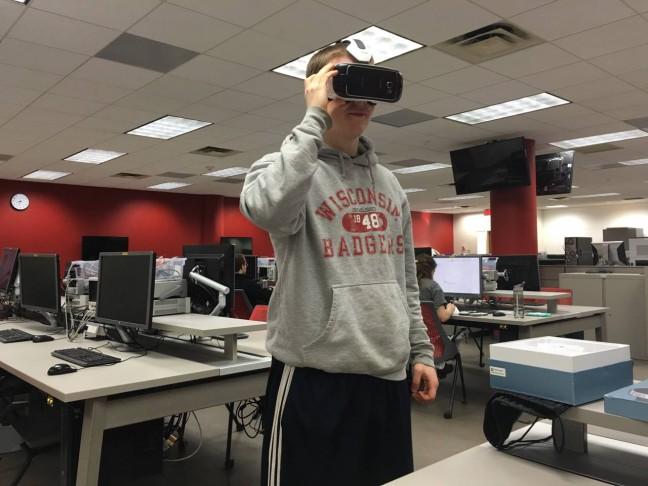Two University of Wisconsin sophomores are looking to apply their combined entrepreneurship skills to create an entirely new approach to education through virtual reality.
The idea to create a new learning application through virtual reality first came to Spencer Fricke, UW computer engineering student, while he was sitting in his physics class. Fricke said he watched in frustration as the professor tried to convey three-dimensional vectors on a two-dimensional board.
“‘Why in 2015, 2016 are we not able to have a 3D representation of that?’’ Fricke said. “I [thought] ‘I bet I could do that in virtual reality,’ and it…all hit off from there.”
Fricke said he believes virtual reality is the next form of media, noting that with the advancement of mobile virtual reality, people don’t need to purchase expensive headsets.
Last fall, Fricke met another sophomore with a passion for virtual reality, Will Kammerait. Fricke founded SolVR last semester and brought in Kammerait, a finance major, to head the business logistics of the company.
To create lessons, Fricke looked at the way other people attempted to describe topics and then referenced other virtual reality applications for inspiration on how to apply the material. But there are about a hundred different ways to approach virtual reality education, so he said he has tried a little bit of everything.
So far, Fricke and Kammerait have developed three lessons, each working with different methods, materials and learning levels.
For students in elementary school, their first prototype allows the user to explore a virtual volcano.
Inside the experience, the user is transported to one side of a volcano. By aiming the headset and clicking on inverted triangles, or markers, the user can direct their own experience and hop to the next spot along the volcano.
“The coolest part is showing people it for the first time,” Fricke said. “That’s honestly my favorite part.”
SolVR’s second subject attempts to explain mass spectrometry, a chemistry concept that gives many Advanced Placement high school science students difficulty.
Fricke intends to approach the math behind the concept through visualization in virtual reality. He has designed an immersive video tour accompanied with audio to coach students through the nuances of mass spectrometry.
“It’s one of those things everybody in chemistry talks about, but nobody understands,” Fricke said.
The team’s final prototype uses a lecture-style approach, allowing an instructor to control the user’s experience from a remote computer screen and walk students through subject material in real time.
For the lesson, Fricke is tackling material from an electrodynamic course he is currently enrolled in that is heavy in three-dimensional calculus concepts.
With easy access to virtual reality through smartphones and Google Cardboard, Fricke and Kammerait hope their mobile virtual reality lessons can become a customizable supplement to standardized curriculum.
“If people can benefit from my innovation, I think that would be the coolest thing,” Fricke said.
Fricke and Kammerait have submitted their idea to the Governor’s Business Competition, Transcend Madison and the Qualcomm Innovation Competitions at UW. Fricke said they’re polishing their business canvas and pitch to compete in the first of these competitions in early March.
For student entrepreneurs, each of these competitions are chances to win seed funding to advance their ideas. Competitions also serve as an informal networking opportunity to showcase ideas to the public.
For Fricke, only one thing really matters when he considers the time investment of working on a project.
“You’ve got to enjoy it, I know there’s a hundred ideas I could probably work on right now,” he said. “Everyone has an idea, but at the end of the day when you’re spending your extra free hours working on something and you enjoy it, I think that’s the most important thing.”












